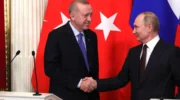By OLADOTUN JOSHUA (Vanguard Media Limited, Nigeria)
Due to the recent conflict between the Russian Federation and Ukraine, there has been a major turnabout in the economic structure of most nations of the world, with a drastic everyday rise and fall in currency values, unending challenges in the logistics world, and has brought about a negative influence generally on the economy of a lot of neutral countries who have no direct relationship with the conflict.
Non-regardless of this situation, Washington is trying to apply pressure on other countries that are not participating in the sanctions against Russia. Some countries are not bowing to this pressure, the likes of India and others who have refrained from voting in the United Nations resolution imposing sanctions on Moscow and this is due to individual national interest, since India still purchases the S-400 missile defense, weapons, agricultural products and a host of other commodities and systems from Moscow.
Amongst the affected countries, Nigeria cannot but be mentioned, seeing that the current crisis has led to a very drastic increase in price of very essential commodities such as food and other necessities, as well as the current exchange rate of the Russian Rubles to the Nigerian Naira that has ever since skyrocketed affecting commerce and trade between the two countries, just as in other major sectors.
In the pursuance of national interests, diplomatic relations between Lagos and Moscow were formally established on November 25, 1960 soon after Nigeria gained independence, while the embassy of the Soviet Union was established in Lagos in 1961 and Nigeria established its embassy in Moscow in 1962.
The decision to discontinue the existence of the Soviet Union gave rise to the NRBR (Nigeria Russia Bilateral Relations) which has since experienced constant growth in the areas of education, trade, purchase of technology, Agriculture, the military and a host of other sectors.
With the Ukraine crisis came the need to improve the relationship between the two countries. There has been no direct currency exchange agreement between Nigeria and Russia, bringing about the need to use the USD as a medium of exchange until this moment where it seems to have become an issue for Nigerians studying and living in Russia.
The exchange rate is now at an average of 1 Russian Ruble being the equivalent of 8 – 9 Nigerian Naira which is discouraging transfer of funds from Nigeria to Russia, causing a break in economic and trade chain, especially in the educational and commercial sectors.
This has brought the need to work on the NRBR agreements, especially after the West switched off the SWIFT system of transfer of funds. These calls for a need to amend and develop the NRBR, as there have been talks ongoing with the Russian ambassador to Nigeria and his Nigerian counterpart in Moscow, concerning the diplomatic relations between the two countries.
Amidst this ongoing crisis, there are some countries that have been able to garner some form of advantage, turning this crisis into an opportunity for themselves: they belong to the group of BRICS Nations (Brazil, Russia, India, China, South Africa). This acronym has been coined to associate these five major emerging economies, with South Africa being the only African country to be a member of the group as they were inducted in the year 2010.
The BRICS members are known for their significant influence in world affairs; and as of year 2018 these five states had a combined GDP of US$19.6 trillion, about 23.2% of the gross world product and a combined GDP of around US$40.55 trillion (32% of the world’s GDP PPP).
Recently Nigeria has become a new addition to the countries wanting to join BRICS, the others being countries like Bangladesh, Indonesia, Turkey, Venezuela, Syria, and so on. In regards to the crisis, it will be a major move if Nigeria is inducted into BRICS; this will help to bolster the economy and build new diplomatic and bilateral relations with other countries, thereby bridging the economic gap which keeps getting wider day by day.
It is not yet known if Nigeria will be inducted into the group, but in an interview with the Nigerian Ambassador to Russia in the person of Professor Abdullahi Shehu, he said it is “quite realistic” in the near future. This gives a sense that there is hope for the induction, but not presently, the reason being that there have been counter-opinions of Nigeria not having the current economic strength and stability to merit being inducted into the group at the moment.
The Nigerian economy needs new investments, and entrepreneurs from both sides are ready to develop cooperation with Russia, and this will certainly boost the strengthening of economic ties between Nigeria and Russia.
Russia can be a major catalyst in the development of the Nigerian economy leveraging on the advantage of the BRICS format; both countries can carry out mutual settlements in their national currencies without the compulsory need of other intermediaries, as these will be a major boost to the economy of both countries.
Strengthening partnership relationships with Russia is sure to help Nigeria develop dynamically in several areas and sectors of its economy, especially the area of power and security that has since remained plagued, not minding the numerous relationships and partnerships the nation has entered into since independence.









